牛津深圳版七年级下 6.5 Unit 6 Listening and Speaking(课件)
文档属性
| 名称 | 牛津深圳版七年级下 6.5 Unit 6 Listening and Speaking(课件) | 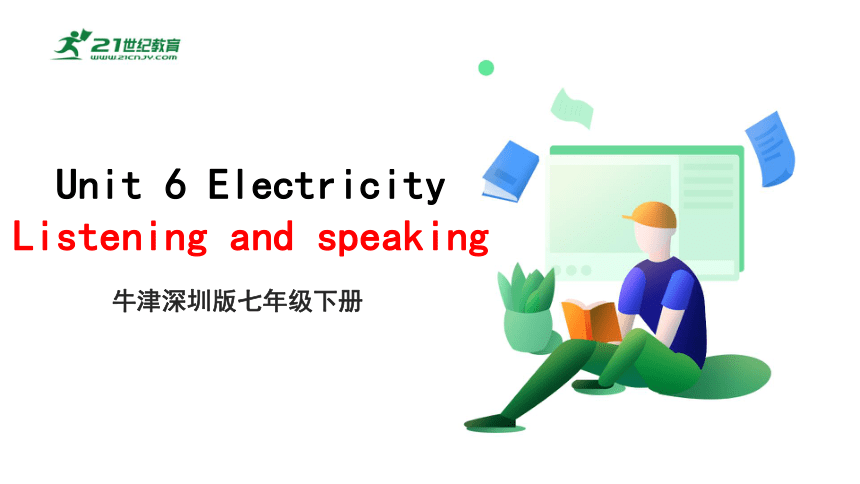 | |
| 格式 | pptx | ||
| 文件大小 | 7.3MB | ||
| 资源类型 | 试卷 | ||
| 版本资源 | 牛津深圳版 | ||
| 科目 | 英语 | ||
| 更新时间 | 2023-04-12 16:07:58 | ||
图片预览

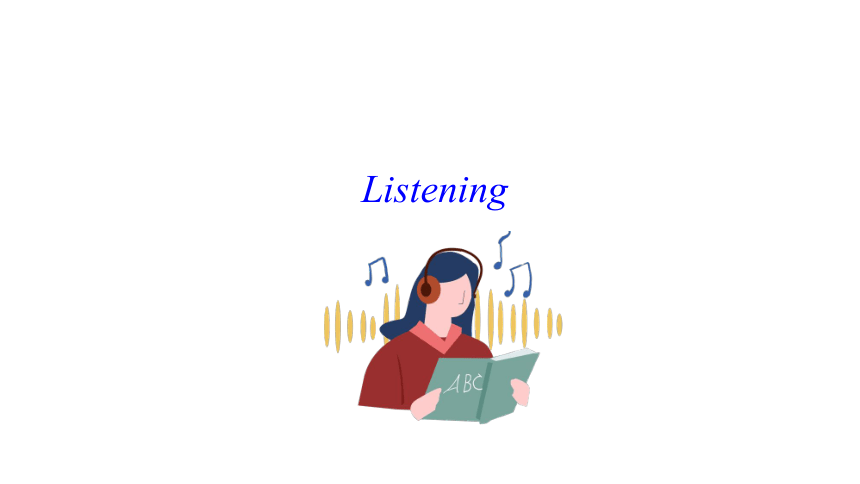
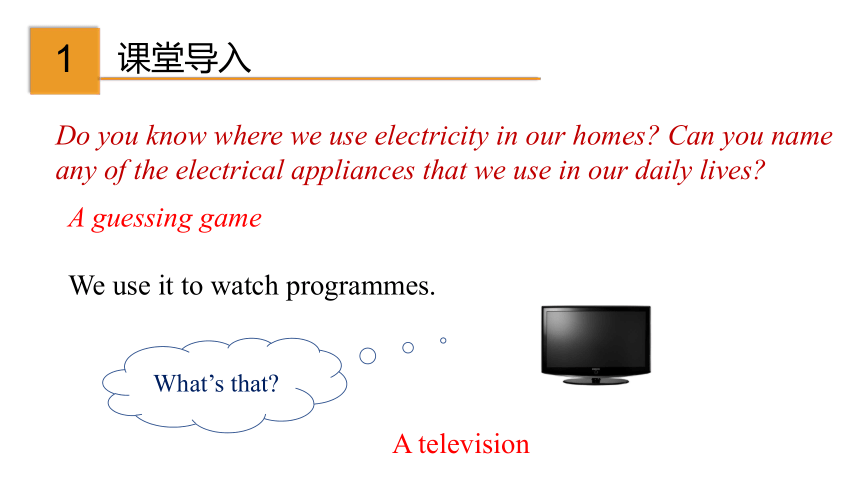
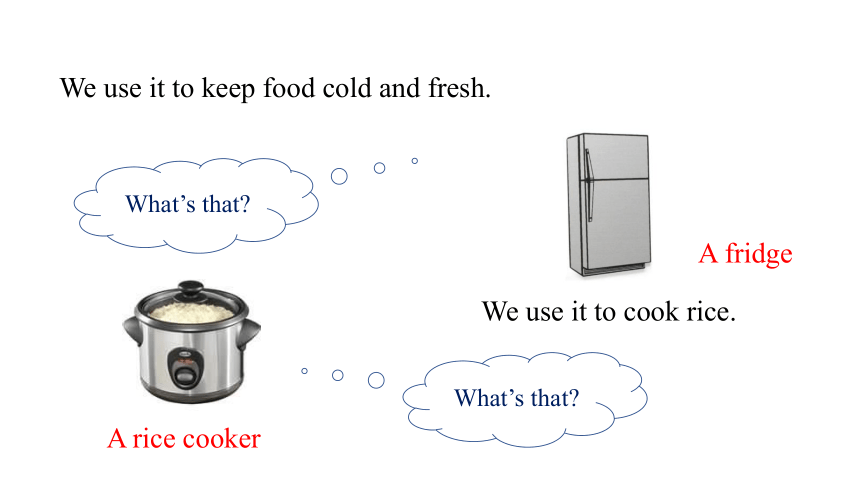
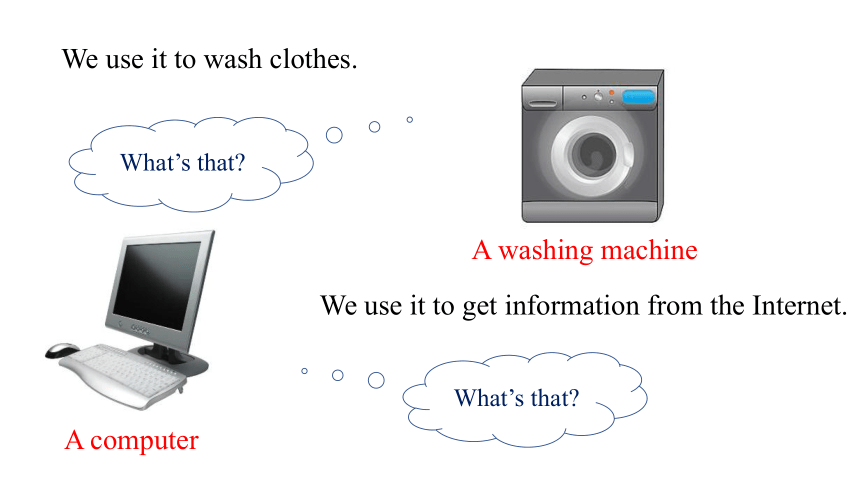
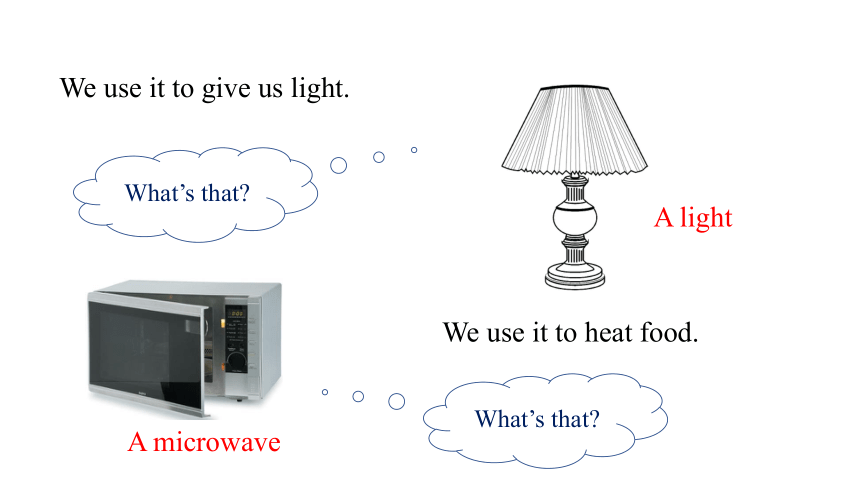
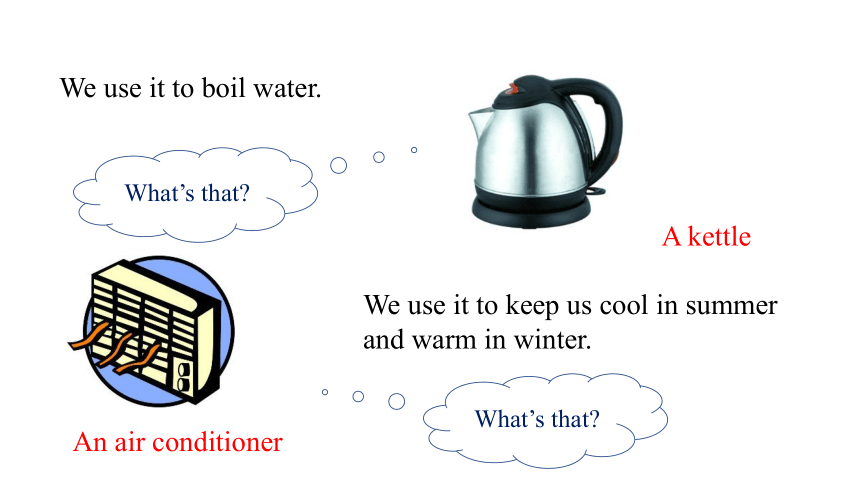
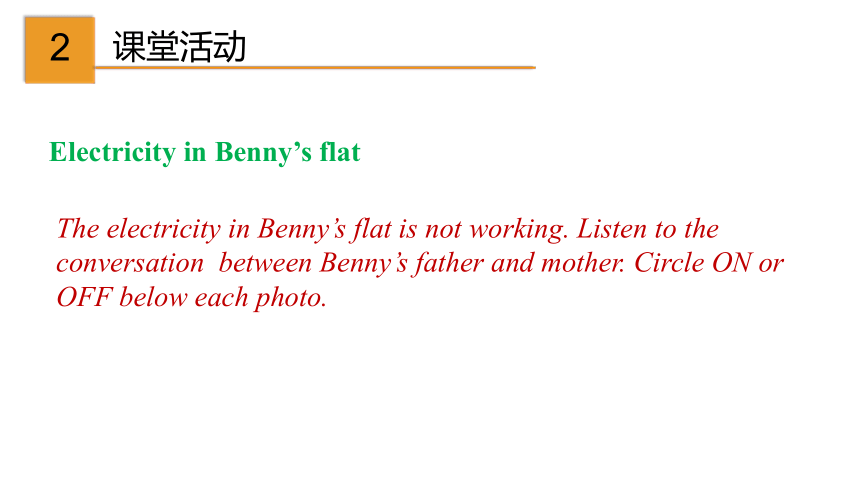
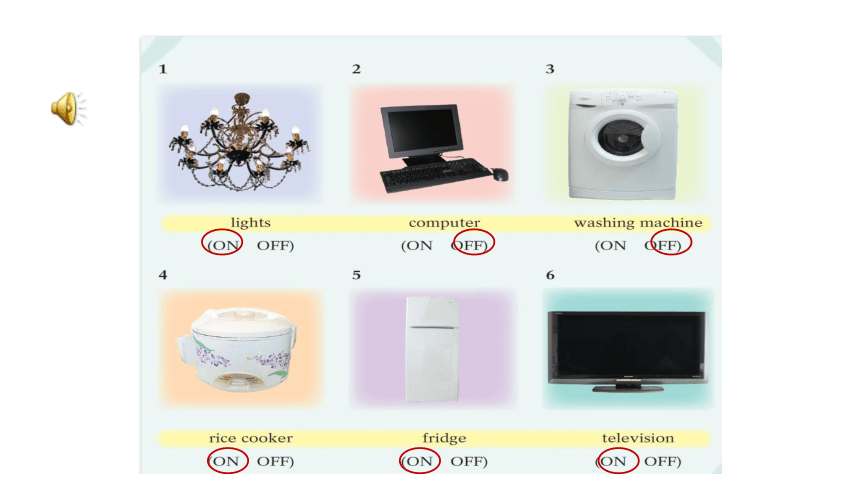
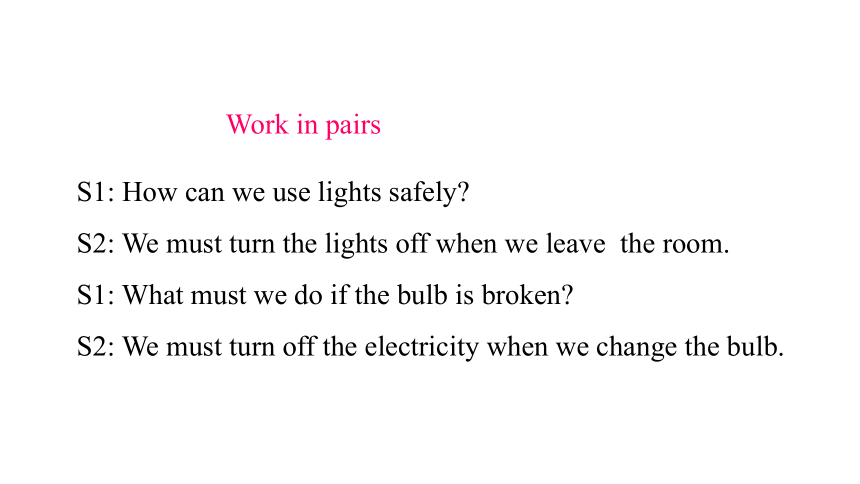
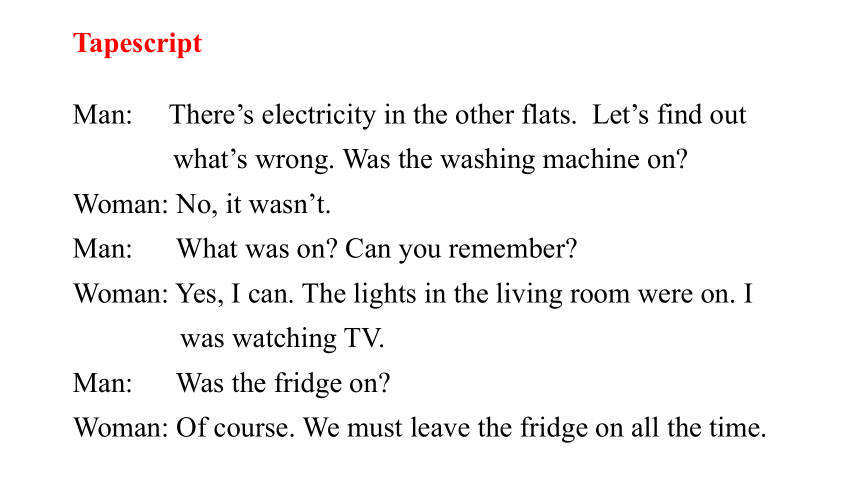

文档简介
(共31张PPT)
Unit 6 Electricity
Listening and speaking
牛津深圳版七年级下册
Listening
We use it to watch programmes.
A television
A guessing game
Do you know where we use electricity in our homes Can you name any of the electrical appliances that we use in our daily lives
1
课堂导入
What’s that
We use it to keep food cold and fresh.
A fridge
What’s that
We use it to cook rice.
A rice cooker
What’s that
We use it to wash clothes.
What’s that
We use it to get information from the Internet.
What’s that
A washing machine
A computer
We use it to give us light.
What’s that
We use it to heat food.
What’s that
A light
A microwave
We use it to boil water.
What’s that
What’s that
A kettle
We use it to keep us cool in summer and warm in winter.
An air conditioner
The electricity in Benny’s flat is not working. Listen to the conversation between Benny’s father and mother. Circle ON or OFF below each photo.
2
课堂活动
Electricity in Benny’s flat
The electricity in Benny’s flat is not working. Listen to the conversation between Benny’s father and mother. Circle ON or OFF below each photo.
Work in pairs
S1: How can we use lights safely
S2: We must turn the lights off when we leave the room.
S1: What must we do if the bulb is broken
S2: We must turn off the electricity when we change the bulb.
Man: There’s electricity in the other flats. Let’s find out
what’s wrong. Was the washing machine on
Woman: No, it wasn’t.
Man: What was on Can you remember
Woman: Yes, I can. The lights in the living room were on. I
was watching TV.
Man: Was the fridge on
Woman: Of course. We must leave the fridge on all the time.
Tapescript
Man: Was the computer on
Woman: No.
Man: How about the rice cooker
Woman: Oh, yes, I remember. It was time to cook
dinner and I just turned on the rice cooker.
Man: I think we need to take a look at the rice cooker.
Speaking
英语单词由音节组成。所有的单词都有一个或多个音节。
3
课堂活动
English words are made up of different parts. These parts are called syllables. Every word has one or more syllables.
A Talk time
syllables
form
cooker
computer
supermarket
electricity
一个音节通常都有一个元音。但下列单词中粗体的辅音也是一个独立的音节。
A syllable usually has a vowel sound. However, the consonant
sounds in bold in the following words are separate syllables too.
little middle pencil people table uncle
音节:有的单词只包括一个音节,有的单词包含两个、三个或更多的音节,分别称为单音节词、双音节词和多音节词。 单音节词一般都是重读的。双音节词一般只有一个音节是重读的。多音节词除了重读音节外,有时还有一个次重读音节。
音节的核心是元音。少数辅音字母,如l、m、n也可以构成非重读音节。一个音节里可以只有一个元音字母而没有其他字母,如i 、a。元音字母的前面或后面可以有一个或两个辅音字母。如we, she, at, ask, box, them, desk, middle, letter等。
音节
Read the following words aloud. Pay attention to the syllables in the words.
form
cooker
computer
supermarket
electricity
little
middle
pencil
people
table
uncle
Look at the syllables bine them into words with hyphens(-).
in-side
ca-ble
ex-am-ple
en-er-gy
A1
3
1
2
3
2
3
3
4
5. candle
6. dangerous
7. battery
8. American
1. newspaper
2. hear
3. able
4. anyone
Say these words. Then write the number of syllables in brackets.
A2
S1: May I change the bulb
S2: No, you may not. You must switch off the
electricity. Then you may change the bulb.
Johnny’s father is talking to Johnny about safety at home. Work in pairs. S1 is Johnny. S2 is Dad.
B Speak up
cover the meat
lock the door
switch off the electricity
test the water
tidy up
What is he going to do now
Work in pairs
______ put the meat in the fridge
S1: May I put the meat in the fridge
S2: No, you many not. You must cover the
meat. Then you may put the meat in the fridge.
______ go to bed
S1: May I go the bed
S2: No, you many not. You must lock the
door. Then you may go to bed.
______ take a bath now
S1: May I take a bath now
S2: No, you many not. You must test the
water. Then you may take a bath.
______ go out now
S1: May I go out now
S2: No, you many not. You must tidy up.
Then you may go out.
4
课堂小结
1.We have listened to a conversation about electricity in a flat.
2. We have learned to identify the syllables in English words.
3. We have learned to talk about safety rules at home.
一、找出每组单词中音节数目与其他三项不同的一项。
( )1. A. allow B. beautiful C. airport D. happy
( )2. A. bright B. clever C. wise D. good
( )3. A. careful B. helpful C. useful D. wonderful
( )4. A. crazy B. interesting C. excited D. important
( )5. A. battery B. example C. model D. possible
C
B
B
D
A
5
课堂训练
二、 情景问答
你正在和你的朋友讨论电。请利用下面的问题与你的同学进行问答训练。
1. Where does electricity usually come from
It usually comes from a power station.
2. How does electricity come to your home
It comes to our homes through wires.
3. What kind of electrical appliances use batteries
Some small electrical appliances such as torches and mobile phones use batteries.
三、思维导图复述
根据教材P73的课文内容完成下面的思维导图,再根据思维导图,复述该篇课文的内容。
1. get him a packet of electricity
2. Electricity gives us power. It flows through wires and is like
water, in a way
3. Electricity comes into our flat through thin wires. The wires are
connected to cables under the street, and the cables are connected
to a power station
4. A packet of batteries
5. Benny looked foolish
One evening, Daisy was going to buy a packet of sweets. Her brother Benny asked her to get him a packet of electricity. Then Benny talked about electricity with his parents. In Benny’s opinion, electricity gives us power. It flows through wires and is like water, in a way. Dad added, “Electricity comes into our flat through thin wires. The wires are connected to cables under the street, and the cables are connected to a power station.” Then Daisy came back, she brought a packet of batteries for Benny, and Benny looked foolish in the end.
谢谢
21世纪教育网(www.21cnjy.com)
中小学教育资源网站
兼职招聘:
https://www.21cnjy.com/recruitment/home/admin
Unit 6 Electricity
Listening and speaking
牛津深圳版七年级下册
Listening
We use it to watch programmes.
A television
A guessing game
Do you know where we use electricity in our homes Can you name any of the electrical appliances that we use in our daily lives
1
课堂导入
What’s that
We use it to keep food cold and fresh.
A fridge
What’s that
We use it to cook rice.
A rice cooker
What’s that
We use it to wash clothes.
What’s that
We use it to get information from the Internet.
What’s that
A washing machine
A computer
We use it to give us light.
What’s that
We use it to heat food.
What’s that
A light
A microwave
We use it to boil water.
What’s that
What’s that
A kettle
We use it to keep us cool in summer and warm in winter.
An air conditioner
The electricity in Benny’s flat is not working. Listen to the conversation between Benny’s father and mother. Circle ON or OFF below each photo.
2
课堂活动
Electricity in Benny’s flat
The electricity in Benny’s flat is not working. Listen to the conversation between Benny’s father and mother. Circle ON or OFF below each photo.
Work in pairs
S1: How can we use lights safely
S2: We must turn the lights off when we leave the room.
S1: What must we do if the bulb is broken
S2: We must turn off the electricity when we change the bulb.
Man: There’s electricity in the other flats. Let’s find out
what’s wrong. Was the washing machine on
Woman: No, it wasn’t.
Man: What was on Can you remember
Woman: Yes, I can. The lights in the living room were on. I
was watching TV.
Man: Was the fridge on
Woman: Of course. We must leave the fridge on all the time.
Tapescript
Man: Was the computer on
Woman: No.
Man: How about the rice cooker
Woman: Oh, yes, I remember. It was time to cook
dinner and I just turned on the rice cooker.
Man: I think we need to take a look at the rice cooker.
Speaking
英语单词由音节组成。所有的单词都有一个或多个音节。
3
课堂活动
English words are made up of different parts. These parts are called syllables. Every word has one or more syllables.
A Talk time
syllables
form
cooker
computer
supermarket
electricity
一个音节通常都有一个元音。但下列单词中粗体的辅音也是一个独立的音节。
A syllable usually has a vowel sound. However, the consonant
sounds in bold in the following words are separate syllables too.
little middle pencil people table uncle
音节:有的单词只包括一个音节,有的单词包含两个、三个或更多的音节,分别称为单音节词、双音节词和多音节词。 单音节词一般都是重读的。双音节词一般只有一个音节是重读的。多音节词除了重读音节外,有时还有一个次重读音节。
音节的核心是元音。少数辅音字母,如l、m、n也可以构成非重读音节。一个音节里可以只有一个元音字母而没有其他字母,如i 、a。元音字母的前面或后面可以有一个或两个辅音字母。如we, she, at, ask, box, them, desk, middle, letter等。
音节
Read the following words aloud. Pay attention to the syllables in the words.
form
cooker
computer
supermarket
electricity
little
middle
pencil
people
table
uncle
Look at the syllables bine them into words with hyphens(-).
in-side
ca-ble
ex-am-ple
en-er-gy
A1
3
1
2
3
2
3
3
4
5. candle
6. dangerous
7. battery
8. American
1. newspaper
2. hear
3. able
4. anyone
Say these words. Then write the number of syllables in brackets.
A2
S1: May I change the bulb
S2: No, you may not. You must switch off the
electricity. Then you may change the bulb.
Johnny’s father is talking to Johnny about safety at home. Work in pairs. S1 is Johnny. S2 is Dad.
B Speak up
cover the meat
lock the door
switch off the electricity
test the water
tidy up
What is he going to do now
Work in pairs
______ put the meat in the fridge
S1: May I put the meat in the fridge
S2: No, you many not. You must cover the
meat. Then you may put the meat in the fridge.
______ go to bed
S1: May I go the bed
S2: No, you many not. You must lock the
door. Then you may go to bed.
______ take a bath now
S1: May I take a bath now
S2: No, you many not. You must test the
water. Then you may take a bath.
______ go out now
S1: May I go out now
S2: No, you many not. You must tidy up.
Then you may go out.
4
课堂小结
1.We have listened to a conversation about electricity in a flat.
2. We have learned to identify the syllables in English words.
3. We have learned to talk about safety rules at home.
一、找出每组单词中音节数目与其他三项不同的一项。
( )1. A. allow B. beautiful C. airport D. happy
( )2. A. bright B. clever C. wise D. good
( )3. A. careful B. helpful C. useful D. wonderful
( )4. A. crazy B. interesting C. excited D. important
( )5. A. battery B. example C. model D. possible
C
B
B
D
A
5
课堂训练
二、 情景问答
你正在和你的朋友讨论电。请利用下面的问题与你的同学进行问答训练。
1. Where does electricity usually come from
It usually comes from a power station.
2. How does electricity come to your home
It comes to our homes through wires.
3. What kind of electrical appliances use batteries
Some small electrical appliances such as torches and mobile phones use batteries.
三、思维导图复述
根据教材P73的课文内容完成下面的思维导图,再根据思维导图,复述该篇课文的内容。
1. get him a packet of electricity
2. Electricity gives us power. It flows through wires and is like
water, in a way
3. Electricity comes into our flat through thin wires. The wires are
connected to cables under the street, and the cables are connected
to a power station
4. A packet of batteries
5. Benny looked foolish
One evening, Daisy was going to buy a packet of sweets. Her brother Benny asked her to get him a packet of electricity. Then Benny talked about electricity with his parents. In Benny’s opinion, electricity gives us power. It flows through wires and is like water, in a way. Dad added, “Electricity comes into our flat through thin wires. The wires are connected to cables under the street, and the cables are connected to a power station.” Then Daisy came back, she brought a packet of batteries for Benny, and Benny looked foolish in the end.
谢谢
21世纪教育网(www.21cnjy.com)
中小学教育资源网站
兼职招聘:
https://www.21cnjy.com/recruitment/home/admin
